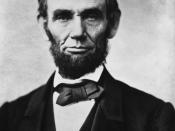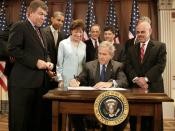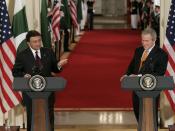Executive privilege, what is it? Executive privilege is when a U.S. president wishes to keep information secret. It has been invoked from George Washington to George W. Bush; however, it is not an executive privilege stated in the Constitution. So, why has Congress passed a bill eliminating the power of executive privilege?
If there was no executive privilege, a president would have to be aware that all of his or her words, documents, and actions could be made public. We know from 20th century history that when a president does not have full executive privilege to protect information, the results can be devastating. If executive privilege were eliminated, it is unlikely that conversations between the president and other members of the executive branch would be recorded or otherwise documented. As a result, we would have fewer records of an administration's activities than we do today.
Without executive privilege, the president might have experienced problems in waging a war on terrorism.
While Congress and the courts have procedures that can be used to guard sensitive information, both branches of government are unaccustomed to keeping secrets and often find hard to do so.
Executive privilege is exactly what it says...a privilege. A privilege is not a right; it can be taken away; however, would it be best to take away executive privilege? The saying, "what someone doesn't know, won't hurt them," can be taken into context when it comes to executive privilege. It protects the nation from things it doesn't need to know. It is the nations best interest to keep executive privilege for the president.






Needs more
Firstly needs a bibliography and secondly you have raised alot of ideas but not given examples. This could be well written if you expanded on your ideas.
0 out of 0 people found this comment useful.